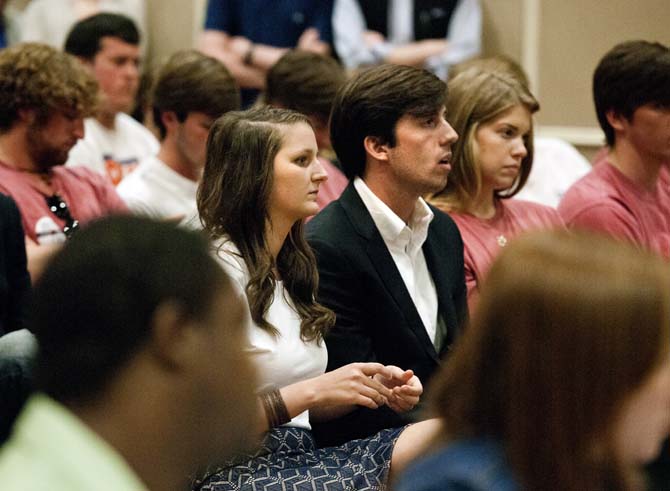After a more than 1,000-vote victory, two University Court hearings and a quick lesson in basic economics, it’s official: Unite LSU candidates John Woodard and Taylor Parks, along with the 56 other candidates on their ticket who won a position, will lead our Student Government.
And rightfully so. Unite LSU won a landslide victory against its competitor without breaking any rules, and we applaud the ticket’s diligence in proving it.
But, as SG Chief Justice Morgan Faulk astutely put it after announcing the decision to overturn Unite’s initial disqualification, Sunday night’s decision was indeed a “lose-lose” for SG.
The platform that aimed to “Unite LSU” has now shown just how disjointed the leadership of SG is.
It’s almost facetious to say this decision should have been an easy one from the start: After a presumably misled perception of Unite’s financial documents — which The Daily Reveille has posted online — and the subsequently botched investigation into the “fair market value” of a campaign banner purchased in bulk, it took all of two separate hearings and more than six hours of deliberations to realize that sometimes, when items are purchased in large quantities, the per-unit price diminishes.
The reported per-banner price of about $77 filed by Unite is approximately 59 percent less than the single-unit price found by the election board’s investigations, namely because, when contacting the retailer Unite purchased from, the board asked for the price of one banner rather than the price of 24 together.
And how did SG Commissioner of Elections Aimeé Simon know the kind of bulk-purchase discount reported by Unite must be unfair, if not impossible?
“Because I’m smart,” she snapped at complainant Kristina Lagasse of Unite.
This kind of arrogant certainty in the face of overturning a — and we repeat — landslide victory is insulting to the election process and to the 20 percent of our student body who maintain enough personal interest to have actually voted in the election. And it’s especially insulting after two hours of hearing almost every complainant and respondent admit no one in the room was an expert on the subject matter.
It also betrays the board’s deliberate aims to cover its tracks and defend its initial decision blindly, for it offered no argument beyond that they investigated “to the best of [their] ability,” as Simon said. One of the election board members on the respondents panel, Trey White, even admitted within a half-hour of discussion that he no longer believed Unite deserved to be disqualified.
All of this is to neglect the fact that more than half of Sunday’s complaint hearing was an argument over the semantics of what constitutes “fair market value,” or what rubric was used to determine that Unite LSU had defied it.
Definitions ranged from “what a retailer markets something as” to “fair market value is in the eyes of the beholder” — both from the election board, and both absurd.
Following the vague definitions proposed by the board, Associate Justice Ryan Silverman reduced their argument to its logical conclusion: “So should we require that all candidates purchase from one vendor?”
As Lagasse noted in her closing remarks Sunday, this debacle should be seen as reason to inspect the election code and refine the rules therein.
“Today, we also need to look to the future,” Lagasse said. “This is a turning point for Student Government.”
She’s right. The alarm bells should be ringing within SG, because on a year with a lower voter turnout than the last, SG has given its voters little reason to trust the organization’s dedication to their input.
The onus is now on SG to prove to the student body that change is coming and reforms will be made to better represent and honor its dwindling student support.
Where will you go from here? How can we prevent something as embarrassing as this election from happening again?
Woodard, as the deserved winner and now president-elect of our student government, must now show his dedication to the student body and his willingness to right the system that wronged him last week.





